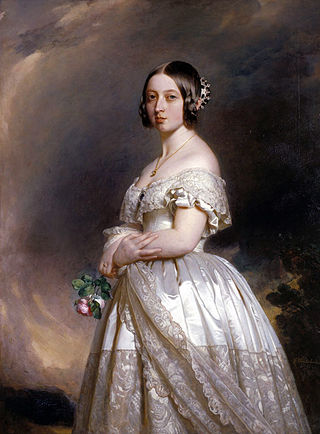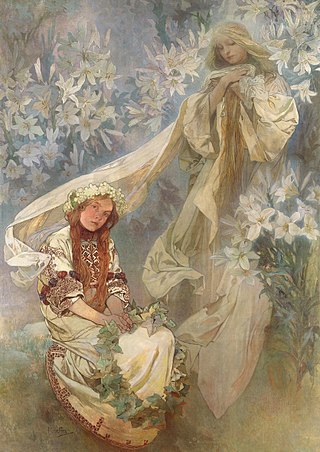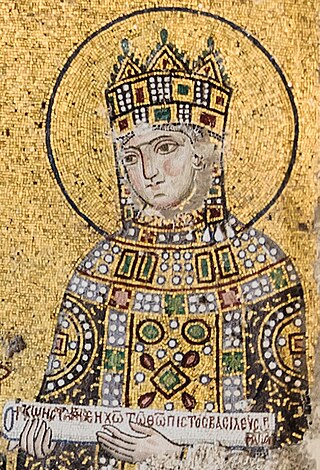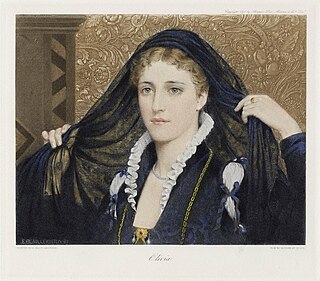Related Research Articles

Chloe, also spelled Chloë, Chlöe, or Chloé, is a feminine name meaning "blooming" or "fertility" in Greek. The name ultimately derives, through Greek, from the Proto-Indo-European root *ǵʰelh₃-, which relates to the colors yellow and green. The common scientific prefix chloro- derives from the same Greek root. In Greek the word refers to the young, green foliage or shoots of plants in spring.
Amy is an English feminine given name, the English version of the French Aimée, which means beloved. It was used as a diminutive of the Latin name Amata, a name derived from the passive participle of amare, “to love”. The name has been in use in the Anglosphere since the Middle Ages. It was among the 50 most popular names for girls in England between 1538 and 1700. It was popularized in the 19th century in the Anglosphere by a character in Sir Walter Scott's 1821 novel Kenilworth, which was based on the story of Amy Robsart. Enslaved Black women in the United States prior to the American Civil War were more likely to bear the name than white American women because slave masters often chose their names from literary sources. The name declined in use after 1880 but was revived due to the hit song Once in Love with Amy from the 1948 Broadway musical Where's Charley?. The name peaked in usage in the United States between 1973 and 1976, when it was among the five most popular names for American girls. It remained among the top 250 names for American girls in the early 2020s.
Natasha is a name of Slavic origin. The Slavic name is the diminutive form of Natalia.

Victoria is a feminine first name. It is also used as a family name.

Samantha is a feminine given name.
Ashley is a given name which was originally an Old English surname. It is derived from the Old English (Anglo-Saxon) words æsc (ash) and lēah and translates to "Dweller near the ash tree meadow".
Cassie is a feminine given name and a short form of various other given names Cassandra, Cassandro, and Cassidy mostly used in English-speaking countries. It is more rarely a surname. People and fictional characters named Cassie include:

Angela is a female given name. It is derived from the Greek word ángelos (ἄγγελος), meaning angel from Greek mythology. In the United States, the name "Angela" was at its most popular between 1965 and 1979, when it was ranked among the top 10 names for girls. Between 1922 and 2021, in the United States, the name was ranked in the top 35 names for girls.
Jodie is a unisex given name. It is related to names Cody, Jodi, Jody, Codey, and Jodey. It is also a rare surname. It can be used as a nickname for Joseph, Jude, Judith, Joan and Jonathan, and a variant for Jo.

Lily is a feminine given name usually derived from lily, the flower. The name became particularly popular along with other flower names for girls during the 1800s and early 1900s. The lily also has associations with and has been symbolic of innocence and purity in Christian art. Names beginning with or containing the letter L have also been particularly fashionable for girls. It is also occasionally used as a diminutive for other names such as Elizabeth.

Zoe, Zoey, Zoie, Zoi, Zoé or Zoë is a female first name of Greek origin, meaning "life". It is a popular name for girls in many countries, ranking among the top 100 names for girls born in the United States since 2000. It is also well used in other English-speaking countries including Australia, Canada, Ireland, New Zealand, and the United Kingdom, as well as in other countries including Belgium, Czech Republic, France, Hungary, Italy, Mexico, Netherlands, Spain, and Switzerland.

Tiffany is a primarily English feminine form of the Greek given name Theophania. It was formerly often given to children born on the feast of Theophania, that is, Epiphany. The equivalent Greek male name is Theophanes (Θεοφάνης), commonly shortened to Phanis (Φάνης) and the female is Theophania (Θεοφανία) or Theophano (Θεοφανώ), colloquially Phani (Φανή).

Stephanie is a female name that comes from the Greek name Στέφανος (Stephanos) meaning "crown, wreath, garland". The male form is Stephen. Forms of Stephanie in other languages include the German "Stefanie", the Italian, Czech, Polish, and Russian "Stefania", the Portuguese Estefânia, and the Spanish Estefanía. The form Stéphanie is from the French language, but Stephanie is now widely used both in English- and Spanish-speaking cultures.

Heather is a common English feminine given name.

Emma is a feminine given name. It is derived from the Germanic word ermen, meaning "whole" or "universal". It likely originated as a short form of names such as Ermengarde or Ermentrude. Its earliest use begins at least from the early seventh century, with Frankish royal daughter Emma of Austrasia and the wife of Eadbald of Kent found in written sources. Its popularity in the medieval era increased because it was the name of Emma of Normandy, mother of Edward the Confessor. Emmeline is a Norman variant of Emma that was introduced to England by the Norman invaders in the 11th century. The name is etymologically unrelated to Amalia, Amelia, Emilia, and Emily, all of which are derived from other sources, but all of these names have been associated with each other due to their similarity in appearance and sound. Emma has been used as a short form of some of these names or shares diminutives such as Em or Emmy with them.
The name Brooke is a female given name and less commonly a male given name, also used as a surname. Other forms include Brook. The name "Brooke" is of English origin.

Laura is a traditionally feminine given name in Europe and the Americas, of Latin origin, whose meaning is a metonym for a victor, and an early hypocorism from Laurel and Lauren.
Kim is a unisex given name. It is also used as a diminutive or nickname for names such as Kimber, Kimberly, Kimberley, Kimball and Kimiko. In Kenya, it is short for various male names such as Kimutai and Kimani. In Vietnam, it is also a unisex name.

Olivia is a feminine given name in the English language. It is derived from Latin oliva, olive. Both Oliva and Olivia were Latinate forms in use in English-speaking countries as early as the 13th century. Olive was in common use as a vernacular form. Though not invented by William Shakespeare, the name was popularized by a character in Twelfth Night.

Maxine is an English feminine given name created as a feminine version of the name Max.
References
- ↑ DeGategno, Paul J.; R. Jay Stubblefield (2006). Critical Companion to Jonathan Swift. p. 42.
- ↑ "Social Security Administration". Archived from the original on 2 February 2018. Retrieved 26 July 2008.
- ↑ "Popularity of the name 'Vanessa' in Germany" (in German). 19 July 2016.